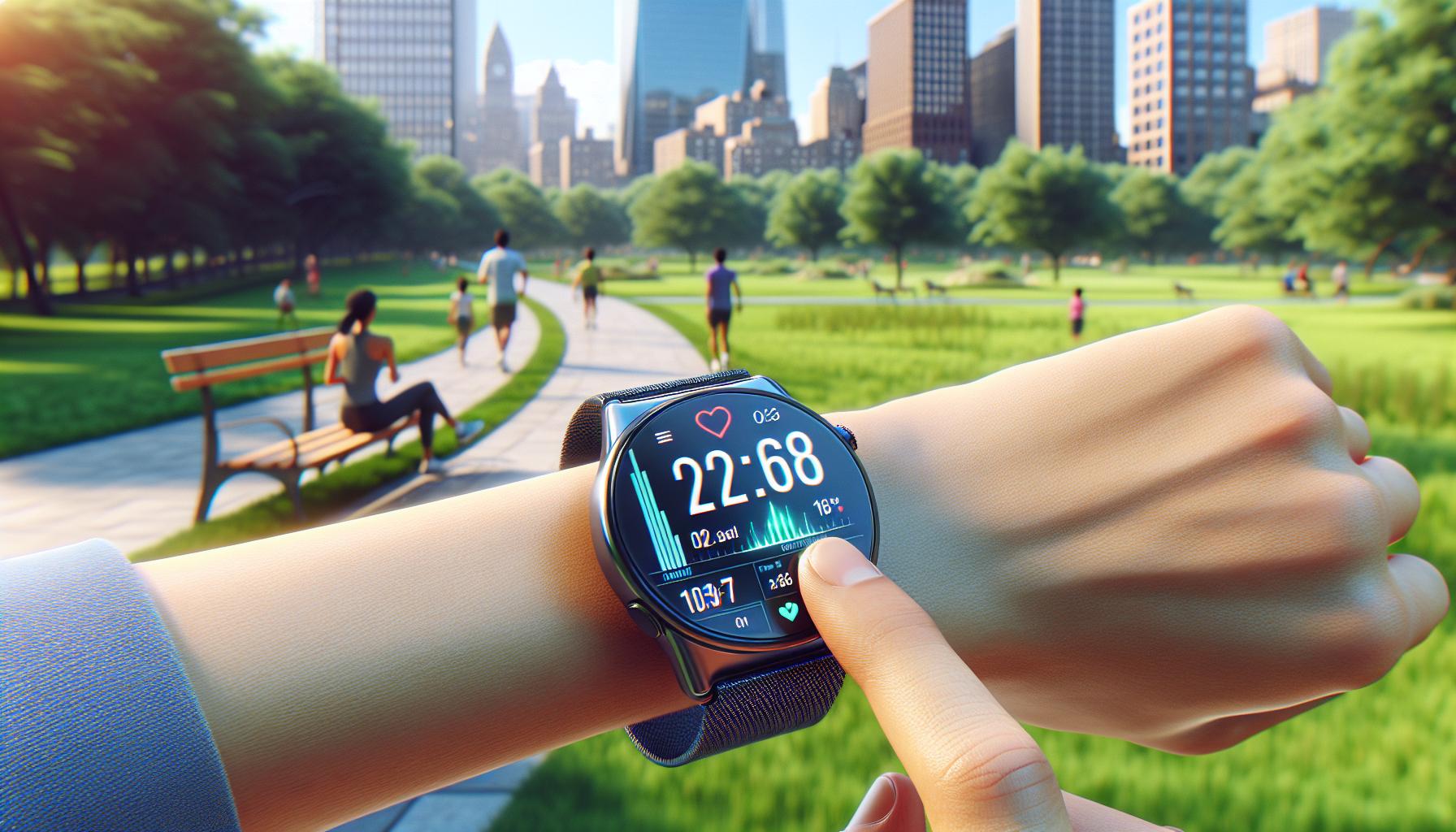In a world where everyone’s trying to outsmart their own bodies, wearable health tech is the new superhero in town. Gone are the days of guessing your heart rate or counting steps like a confused toddler. With smartwatches and fitness trackers strapped to wrists everywhere, monitoring health has never been easier—or more stylish.
Wearable Health Tech
Wearable health tech encompasses devices designed for continuous monitoring of health metrics. These gadgets, such as smartwatches and fitness trackers, collect data on heart rate, steps taken, and sleep patterns. Users benefit from real-time insights, enabling proactive health management.
Smartwatches integrate seamlessly with smartphones. Connectivity allows users to receive notifications, respond to messages, and track activities without distractions. Fitness trackers specialize in activity monitoring, motivating users to achieve fitness goals and maintain an active lifestyle.
Data collected by these devices contributes to personalized health insights. With cumulative statistics, users can identify trends and make informed decisions regarding their well-being. Advanced wearables now offer features like ECG monitoring, SpO2 tracking, and even stress management tools, elevating their utility beyond fitness tracking.
Additionally, the integration of wearable tech in healthcare settings aids providers in patient monitoring. Remote patient management systems allow healthcare professionals to track vital signs and other health data, facilitating timely interventions when needed.
Market growth reflects the increasing popularity of wearable health technology. Statista reports that the global market for wearables is expected to reach approximately $60 billion by 2023. This surge indicates a strong consumer demand for devices that promote health and wellness.
Wearable health tech reshapes individuals’ approach to health. As technology evolves, users can anticipate enhanced features and greater integration within their daily lives. Constant advancements encourage a proactive mindset toward health maintenance.
Types Of Wearable Health Tech

Wearable health tech encompasses various devices that monitor health metrics. These technologies allow users to track their fitness and overall wellness conveniently.
Fitness Trackers
Fitness trackers monitor physical activity and offer insight into user performance. These devices count steps taken, calories burned, and distance traveled. Many fitness trackers include heart rate monitors, providing users with real-time cardiovascular data. Some models even track sleep patterns, helping users understand their rest quality. Popular brands include Fitbit, Garmin, and Xiaomi, which continuously innovate by adding features like GPS and water resistance. Users often rely on fitness trackers to set goals and maintain motivation throughout their health journey.
Smartwatches
Smartwatches have evolved into versatile health tools beyond mere timekeeping. They provide notifications, manage calls, and sync with smartphones to ensure seamless access to information. Advanced models include fitness tracking, heart rate monitoring, and even blood oxygen level measurements. Popular brands like Apple and Samsung embed health apps, enabling users to monitor their wellness effectively. Many also feature GPS functionality for outdoor activities. Smartwatches empower users to stay connected while keeping their health in check.
Health Monitoring Devices
Health monitoring devices focus on specific health metrics for deeper insights. These gadgets include wearables that track ECG, blood pressure, and glucose levels. For instance, devices like the AliveCor KardiaMobile provide on-the-go ECG readings, offering users insights into heart health. Continuous glucose monitors (CGMs) like Freestyle Libre enable diabetic users to track their glucose levels in real time. Many health monitoring devices aid healthcare professionals by supplying crucial data that drives timely interventions. These technologies foster a proactive approach to managing one’s health effectively.
Benefits Of Wearable Health Tech

Wearable health technology offers numerous advantages for users. This technology enhances the way individuals track and manage their health effortlessly.
Improved Health Management
Individuals gain better control over their health through continuous monitoring of vital metrics. Wearable devices like fitness trackers and smartwatches provide real-time data on heart rate, physical activity, and sleep patterns. Users receive alerts for irregularities, prompting timely actions. Improved health management leads to preventive measures, reducing the risk of chronic conditions. With ongoing insights, users stay informed about their fitness levels, empowering them to make healthier choices.
Increased Personal Accountability
Wearable health tech promotes personal accountability for health goals. Users track their progress in achieving fitness objectives like daily steps or calorie intake. Metrics available at their fingertips create a sense of responsibility. Continuous feedback and reminders help individuals remain focused and motivated on their health journey. Social features allow users to connect with friends and communities, further encouraging accountability. Together, these elements foster a culture of self-improvement and dedication to well-being.
Data-Driven Insights
Data-driven insights drive informed health decisions for users. Wearable devices aggregate extensive health information over time, revealing trends in activity and wellness. Individuals identify patterns, enabling them to adjust their habits for better health outcomes. Specific features like heart rate variability and sleep quality analysis provide precise understandings of personal health. Additionally, this data offers healthcare professionals valuable information for assessment and treatment planning. Ultimately, data-driven insights facilitate a proactive approach to health management.
Challenges And Limitations

Wearable health technology faces several challenges and limitations that impact its effectiveness. The accuracy and reliability of data collected by devices often come into question, affecting user trust.
Accuracy And Reliability
Measurements from wearable devices can vary due to factors like sensor placement and user activity. Variations in heart rate readings can occur during exercise or while at rest. Advanced algorithms help improve data interpretation, but inconsistencies may lead to potential misdiagnoses or poor health decisions. Limitations exist, especially in environments with fluctuating conditions, potentially compromising the reliability of data provided. It’s essential for manufacturers to conduct rigorous testing to ensure that devices deliver accurate, dependable health information. Without solid data accuracy, users might mismanage their health based on faulty metrics.
Privacy Concerns
Privacy concerns continue to be a significant issue in wearable health technology. Data breaches pose risks, as sensitive health information can be exposed without proper security measures. Collecting health data from users raises ethical questions about who owns this information and how it can be used. Clear, transparent privacy policies are critical for companies that develop wearable devices. Users must understand how their data gets collected, stored, and shared with third parties. Additionally, compliance with regulations like HIPAA helps protect personal health information, fostering trust in wearable technology. Addressing these privacy concerns is vital for the continued adoption and longevity of these devices.
Future Trends In Wearable Health Tech
Wearable health technology continues to evolve rapidly, with several trends shaping its future. Personalization stands out as a key trend, allowing devices to offer tailored insights based on individual health metrics. Device manufacturers are enhancing artificial intelligence capabilities, enabling wearables to learn users’ habits and preferences over time.
Integration with telehealth services is gaining traction, simplifying remote healthcare access. Users can seamlessly share data with healthcare providers, fostering collaboration and personalized care plans. Moreover, wearable devices are expanding their functions to include mental health monitoring, tracking stress levels and mood fluctuations.
Data privacy and security present ongoing challenges. Stricter regulations are likely to emerge, requiring manufacturers to implement robust encryption and user consent protocols. Transparency regarding data usage will become essential for maintaining user trust.
Health gamification also sees a rise, motivating users to engage with their fitness goals through rewards and challenges. Users can receive notifications or access apps that gamify their activities, increasing overall participation in wellness initiatives.
Wearable health technology is becoming more affordable, with increased competition driving prices down. More consumers can access advanced devices, contributing to widespread adoption.
Lastly, developments in sensor technology are pushing the boundaries of health monitoring. Wearables are integrating advanced sensors that track additional health markers, such as hydration levels and blood oxygen saturation. These advancements will enhance the overall effectiveness of wearable health devices, enabling more comprehensive health management.
These trends will significantly influence the landscape of wearable health technology, enhancing users’ health monitoring experiences while addressing existing challenges.

